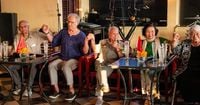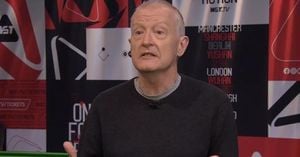On April 27, 2025, a poignant gathering took place at the Caravelle Hotel in Ho Chi Minh City, where over 50 war correspondents from Vietnam and around the world convened to reflect on their experiences during the Vietnam War. This event was organized by the Ministry of Foreign Affairs in collaboration with the Ho Chi Minh City People's Committee, marking a significant moment of reconciliation and remembrance.
The Caravelle Hotel, a historic site that once served as a hub for international reporters before the fall of Saigon on April 30, 1975, set the stage for heartfelt exchanges. Among the attendees was Thomas Fox, a former war correspondent for the National Catholic Reporter, who shared his transformative journey from a civilian volunteer to a reporter dedicated to revealing the truths of the war. "At that time, people in America often said they were doing something good for Vietnam. But from what I witnessed, the reality was that what was happening caused immense suffering for the Vietnamese people. That was when I began to bond with Vietnam. I learned Vietnamese, learned to eat fish sauce, and in 1971, I married a Vietnamese woman from Can Tho," Fox recounted in fluent Vietnamese.
Fox's reflections were met with applause as he expressed his admiration for the resilience of the Vietnamese people. He noted, "I am happy to witness the vibrant spirit of the younger generation in Vietnam. The Vietnamese love themselves and each other very much. Since the country was unified, Vietnam has truly become a common home for its people across the North, Central, and South regions."
Adding to the emotional atmosphere, Doan Minh Tuan, a 94-year-old journalist and writer, humorously remarked on his age and experiences in the revolution against French and American aggression. "I want to sincerely thank America and our friends for supporting Vietnam during the war. I highly appreciate war correspondents, as thanks to you, the world came to know about Vietnam and the realities of the war. You also contributed to the reconciliation process after the war," Tuan said.
As the event progressed, Fox and other guests joined hands, raising them in a show of solidarity among journalists who once reported from the same battlefield. The gathering was not just a reunion but a collective acknowledgment of the past and the shared commitment to peace.
Earlier in the day, the group visited the War Remnants Museum, where Fox donated a copy of the book "Living with Agent Orange: Conversations in Postwar Viet Nam," authored by Diane Niblack Fox. He spoke solemnly about the significance of the museum, stating, "We are standing on sacred ground, a place that has witnessed so much suffering. Yet, many have risked their lives to tell the truth. Many Americans agree on one thing: We came to Vietnam not to harm anyone. But we know that the war caused too much sorrow. On behalf of conscientious Americans, we apologize for what our country has done to this land. We hope that the Vietnamese will feel the sincerity in this apology. The feelings and memories here will stay with us for life."
Fox's apology, delivered in Vietnamese, was a rare gesture. "Almost no American has apologized to the Vietnamese in Vietnamese. This motivated me to send my apology," he shared with Tuoi Tre Online.
Another notable attendee was Edith Lederer, the first foreign female correspondent stationed in Saigon during the war. She presented a copy of a LIFE magazine issue dated March 22, 1968, featuring a portrait of President Ho Chi Minh to the museum. "I see this area, now much larger than my memory, has a wall displaying photos of a former LIFE magazine correspondent. I love flea markets, and once while shopping in New York City, I found an item that I thought would be the perfect gift for this museum," Lederer explained.
During the visit, Marianne Harris, the wife of the late journalist Tim Page, inquired about the health of a former intelligence officer who had worked in Quang Tri Citadel. Page was instrumental in creating the "Requiem" exhibition at the museum, which highlights the experiences of war correspondents.
In a parallel narrative, Frank Snepp, a former CIA analyst, reflected on the chaotic final moments in Saigon before the fall of the city on April 30, 1975. Snepp, who had been responsible for evacuating former President Nguyen Van Thieu to Taiwan just days before the collapse, expressed deep regrets about not acting sooner to evacuate vulnerable Vietnamese allies. "What if I had grabbed the ambassador by the collar and said: Please believe in our best spies?" he pondered during an interview with BBC News.
Describing the day before the war's end, Snepp recalled the disarray at the U.S. Embassy, which lacked a list of Vietnamese citizens at high risk for reprisals. "On April 29, chaos reigned as anyone, man, woman, or child, had to fend for themselves. The embassy was overwhelmed, and thousands of Vietnamese were crying, shouting, and climbing walls to get inside," he said.
As the situation deteriorated, the runways at Tan Son Nhat Airport were destroyed, leaving helicopters as the only means of escape. Snepp recounted how 17 small Air America helicopters scrambled to transport people to safety, primarily to the U.S. Embassy and the Defense Attaché Office. "I arrived at the embassy around 6 a.m. and helped people climb over the walls, directing helicopters to rescue those in need. The CIA's operations room was chaotic, with cries for help coming over the radio. We were in a desperate race against time," he described.
By mid-morning, the embassy was flooded with thousands of desperate individuals, all seeking refuge. The temperature soared to around 40 degrees Celsius, exacerbating the tense atmosphere. Amidst the turmoil, a grenade exploded across the street, killing several people, underscoring the perilous conditions.
As the day wore on, the U.S. Embassy became a fortress amid a sea of humanity, with Snepp and his colleagues doing everything they could to facilitate evacuations. However, the disorganization and lack of preparation meant that many were left behind. As the final hours approached, the embassy received word from Washington that all Americans needed to evacuate.
On the evening of April 29, Snepp was informed he had to leave with the last group of 17 CIA officers. As he boarded a helicopter, he looked down at the throngs of people waiting in the courtyard, their desperate faces etched in his memory. The helicopter took off, evading gunfire as it flew toward the USS Denver, a ship positioned offshore for the evacuation.
Reflecting on the events of that fateful day, Snepp expressed his enduring sorrow and guilt over the chaos and loss of life. "I know that my memories are just footnotes compared to the suffering endured by the Vietnamese on both sides, as well as the American soldiers who fought in the war. They are the ones we should remember," he concluded.




